情态动词+have done的用法
情态动词have_done

情态动词+have+done是历年高考的重点和难点之一,现将其用法总结归纳如下:一、must+have+done表示对过去事情的肯定推测,译成“一定做过某事”,该结构只用于肯定句.1. It must have rained last night, for the ground is wet. 昨晚一定下雨了,因为地面还是湿的2. You must have been mad to speak to the servant.你和仆人说话,一定是发疯了二、“can't+have+done”表示对过去事情的否定推测,译成“不可能做过某事”。
1. Mr. Smith can't have gone to Beijing, for I saw him in the library just now. 史密斯先生不可能去北京了,我刚才还在图书馆见过他。
2.Mary can't have stolen your money. She has gone home.玛丽不可能偷你的钱,她回家去了三、“can+have+done”表示对过去行为的怀疑,用于疑问句,译成“可能做过……吗?”。
1.There is no light in the room. Can they have gone out?屋里没有灯,他们可能出去了吗?2. There is nowhere to find them. Where can they have gone? 到处找不到他们,他们可能到什么地方去呢?四、could+have+done’是虚拟语气,表示对过去事情的假设,意思是本来能够做某事而没有做.He could have passed the exam, but he was too careless.本来他能通过考试,但他太粗心五、“may+have+done”表示对发生过的事情的推测,意思是“可能已经”或“也许已经”,用于肯定句中。
情态动词加have done的用法
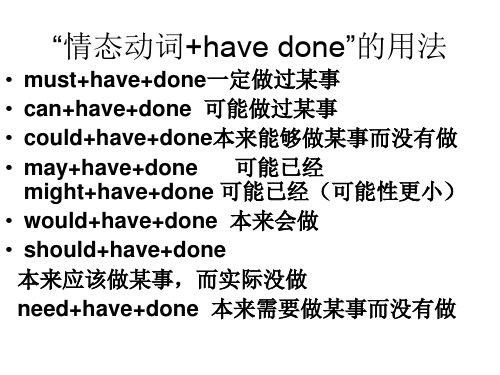
四、 “may+have+done”
• 表示对发生过的事情的推测,意思是“可 能已经”或“也许已经”,用于肯定句中。 • • • • —What has happened to George? —I don't know. He may have got lost. —乔治发生了什么事? ——我不知道,他可能迷路了。
一、 “must+have+done”
• 表示对过去事情的肯定推测,译成“一定 做过某事”,该结构只用于肯定句。 • 1. It must have rained last night, for the ground is wet. 昨晚一定下雨了,因为地面 还是湿的。
2. You must have been mad to speak to the servant. 你和仆人说话,一定是发疯了。
八、 “should+have+done”
• 意思是“本来应该做某事,而实际没做。” “shouldn‘t+have+done”表示本来不应该做某 事,而实际做了。含有指责对方或自责的含意。 • • 1. Tom, you are too lazy. The work should have been finished yesterday. 汤姆,你太懒惰了,这 项工作本来应该昨天就做完的。 • 2. Look, Tom is crying. I shouldn't have been so harsh on him. 看,汤姆哭了,我本来不应该对他 如此严厉。
九、 “ought to+have+done”
• 表示过去应该做而实际并没有做,译成 “理应做……”,往往表示遗憾。与 “should+have+done”用法基本一样。
情态动词+have_done的用法

六、 “would have done”
❖ 虚拟语气,表示对过去事情的假设,意思是 “本来会做”。
--- Really? I can’t imagine that he _______ have done such a thing.
A. must B. may C. can D. should
❖ 5.--- Was it you that made the suggestion? --- It have been. I can’t remember. A. need B. must C. should D. may
❖ 6.The weather turned out to be fine yesterday. I_________ the trouble to carry my umbrella with me .
A. should have taken B. could have taken C. needn't have taken D. mustn't have taken
❖ I needn’t have bought so much wine—only five people came. 我本来没有必要买这么多酒,只来了 五个人。
❖ He need have hurried to the station. In that case, be wouldn't have missed the train. 他本来需要快点 去车站,那样的话,他就不会误了火车。
情态动词+have_done的用法

• I didn’t hear the phone. I ____ asleep. (MET 89) • A. must be B. must have been • C. should be D. should have been
• 【经典考例1】 The weather turned out to be 经典考例 】 fine yesterday. I ________ the trouble to carry my umbrella with me. (2006江西 江西) 江西 • A. should have taken B. could have taken • C. needn't have taken D. mustn't have taken • 【经典考例2】 As you worked late yesterday, 经典考例 】 you ________ have come this morning. (2006 陕西) 陕西) • A. mayn't B. can't • C. mustn't D. needn't
三、 “can+have+done”
• 表示对过去行为的怀疑,用于疑问句,译 表示对过去行为的怀疑,用于疑问句, 可能做过……吗?”。 成“可能做过 吗 • 1. There is no light in the room. Can they have gone out? 屋里没有灯,他们可能出去了吗? 屋里没有灯,他们可能出去了吗? • 2. There is nowhere to find them. Where can they have gone? • 到处找不到他们,他们可能到什么地方去 到处找不到他们, 呢?
情态动词+have done的构成及用法含译文
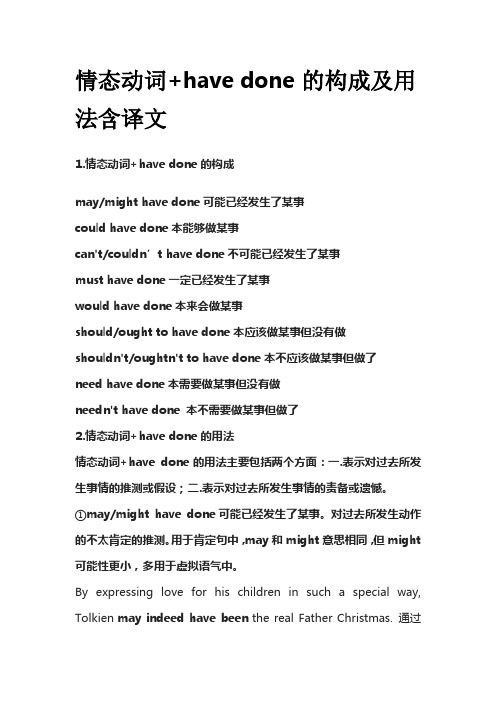
情态动词+have done的构成及用法含译文1.情态动词+have done的构成may/might have done可能已经发生了某事could have done本能够做某事can't/couldn’t have done不可能已经发生了某事must have done一定已经发生了某事would have done本来会做某事should/ought to have done本应该做某事但没有做shouldn't/oughtn't to have done本不应该做某事但做了need have done本需要做某事但没有做needn't have done 本不需要做某事但做了2.情态动词+have done的用法情态动词+have done的用法主要包括两个方面:一.表示对过去所发生事情的推测或假设;二.表示对过去所发生事情的责备或遗憾。
①may/might have done可能已经发生了某事。
对过去所发生动作的不太肯定的推测。
用于肯定句中,may和might意思相同,但might 可能性更小,多用于虚拟语气中。
By expressing love for his children in such a special way, Tolkien may indeed have been the real Father Christmas. 通过这种特别的方式表达对孩子们的爱,托尔金可能真的是真正的圣诞老人。
(新外研版必修二)You can check his office. He might have been there already. 你可以去他的办公室看看。
他可能已经到那儿了。
If he had been given more encouragement, he might have made greater progress. 如果给他更多的鼓励,他可能会取得更大的进步。
【VIP专享】情态动词+have-done的用法

一,“must+have+done”
表示对过去事情的肯定推测,译成“一定做 过某事”,该结构只用肯于定_____句。 1. It must have rained last night, for the ground is wet.
昨晚一定下雨了,因为地面还是湿的。
• I needn‘t have bought so much wine—only five people came.
•我本来没有必要买这么多酒,只来了五个人。
• He need have hurried to the station. In that case, be wouldn't have missed the train.
2.You must have been mad to speak to the servant.
你和仆人说话,一定是发疯了。
二,“can't+have+done”
• 表示对过去事情的否定推测,译成“不可 能做过某事”。
• 1. Mr. Smith can‘t have gone to Beijing, for I saw him in the library just now.
• 2. Without your help, I wouldn't have achieved so much.
没有你的帮助,我是不会取得如此大的成绩。
十、“need+have+done”
• 表示本来需要做某事而没有做。 “needn‘t+have+done”则表示“本来不需 要做某事而做了”。
• 1. Tom, you are too lazy. The work should have been finished yesterday.
考研语法小知识:情态动词+have done

考研英语情态动词+have done的用法共分为9种,分别为:must have done、may/might have done、can/cannot have done、could have done、might have done、should/ought to have done、needn’t have done、had better have done、would rather have done,具体讲解如下: 情态动词+have done 用法 例句 must have done 表示主观上对过去已经发生的行为进行推测,意为“想必,准是,一定做了某事”。
He was subtilized someone must have entered his room.他敏锐地察觉到一定有什么人进过他的房间。
may/might have done 表示对过去已发生行为的推测,意为“也许/或许已经(没有)……”。
一般用于肯定句或否定句中,不用于疑问句。
用might则表示语气更加不肯定。
A radio announcer may have an audience of millions.一个广播员可能拥有数百万名听众。
can/cannot have done 表示对过去发生的行为的怀疑和不肯定,通常用在否定句和疑问句中。
(can换成could时语气委婉) It beats me how she can have done it.我感到莫名其妙,她怎么竟然做出这样的事。
could have done 可用于肯定句中,表示“可能已经……”之意,此外,还可以表示过去能做而没做的事,有一种对过去未付诸实施的事情的惋惜。
Our ancestors could have killed themselves off with their large brains and dangerous memes, but they pulled through.我们的祖先原本可能会因为自己的硕大头脑和危险的模因而灭亡,好在他们挺了过来。
情态动词+have-done用法
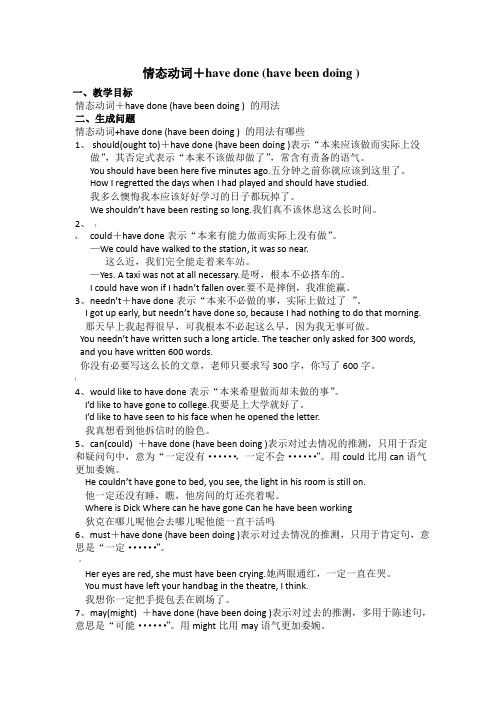
情态动词+have done (have been doing )一、教学目标情态动词+have done (have been doing ) 的用法二、生成问题情态动词+have done (have been doing ) 的用法有哪些1、should(ought to)+have done (have been doing )表示“本来应该做而实际上没做”,其否定式表示“本来不该做却做了”,常含有责备的语气。
You should have been here five minutes ago.五分钟之前你就应该到这里了。
How I regretted the days when I had played and should have studied.我多么懊悔我本应该好好学习的日子都玩掉了。
We shouldn’t have been resting so long.我们真不该休息这么长时间。
2、《3、could+have done表示“本来有能力做而实际上没有做”。
—We could have walked to the station, it was so near.这么近,我们完全能走着来车站。
—Yes. A taxi was not at all necessary.是呀,根本不必搭车的。
I could have won if I hadn’t fallen over.要不是摔倒,我准能赢。
3、needn’t+have done表示“本来不必做的事,实际上做过了”。
I got up early, but needn’t have done so, because I had nothing to do that morning.那天早上我起得很早,可我根本不必起这么早,因为我无事可做。
You needn’t have written such a long article. The teacher only asked for 300 words, and you have written 600 words.你没有必要写这么长的文章,老师只要求写300字,你写了600字。
情态动词+have done用法讲解

1. would have done用于虚拟语气,表示对过去可能发生的情 况进行推测,意为“本来会做” He would have helped me, but he was so busy. 2. need have done 表示“本来需要做某事,但事实上没有做” needn’t have done 则表示“本来不需要做某事,而实际上做了 We need have hurried to school. In that case, we wouldn’t have been late for the class. I needn’t have cooked so many cakes; only two children came.
3. should have done 表示“本来应该做某事,二十几上没有做” shouldn’t have done 则表示“本来不应该做某事,而实际上做 了”,含有职责对法或自责之意。 The essay should have been finished last week, but I forgot it. Tom is crying ; I shouldn’t have been so harsh on him. 4. might have done 表示使对过去情况把握性不大的推测,意为 “可能坐过…”或表示说话人因某人没做某事而不满,意为 “本应该做…” He might have won the race, if you had been backing him. 5. must have done 表示对过去情况的肯定推测,意为“一定做过 某事”,该结构只用于肯定句 It must have rained last night, for the ground is wet.
情态动词+havedone用法总结

情态动词+ have done的用法总结一、“must+have+done”表示对过去事情的肯定推测,译成“一定做过某事”,该结构只用于肯定句。
1. It must have rained last night, for the ground is wet. 昨晚一定下雨了,因为地面还是湿的。
2. You must have been mad to speak to the servant. 你和仆人说话,一定是发疯了。
二、“can't+have+done”表示对过去事情的否定推测,译成“不可能做过某事”。
1. Mr. Smith can't have gone to Beijing, for I saw him in the library just now. 史密斯先生不可能去北京了,我刚才还在图书馆见过他。
2. Mary can't have stolen your money. She has gone home. 玛丽不可能偷你的钱,她回家去了。
三、“can+have+done”表示对过去行为的怀疑,用于疑问句,译成“可能做过……吗?”。
1. There is no light in the room. Can they have gone out? 屋里没有灯,他们可能出去了吗?2. There is nowhere to find them. Where can they have gone? 到处找不到他们,他们可能到什么地方去呢?四、“could+have+done”是虚拟语气,表示对过去事情的假设,意思是本来能够做某事而没有做。
He could have passed the exam, but he was too careless. 本来他能够通过考试,但是他太粗心。
五、“may+have+done”表示对发生过的事情的推测,意思是“可能已经”或“也许已经”,用于肯定句中。
情态动词+have_done的用法及与+v. 的比较

六、 “might+have+done.”
• 表示对过去事情的推测,might与may意思相同, 表示对过去事情的推测, 意思相同, 与 意思相同 但可能性更小。多用于虚拟语气 主结构中。 虚拟语气但可能性更小。多用于虚拟语气 if主结构中。 • • 1. He might have given you more help, even though he was busy. (MET90) 他或许会多给你一 些帮助,即使他很忙。 • 2. She might have achieved greater progress, if you had given her more chances. 如果你多给她 点机会,她可能已经取得更大的成绩。
四、 “could+have+done.”
• 是虚拟语气,表示对过去事情的假设,意 思是本来能够做某事而没有做。 • • He could have passed the exam, but he was too careless. 本来他能够通过考试, 但是他太粗心。
五、 “may+have+done.”
八、 “should (not) +have+done”
• 意思是“本来应该做某事,而实际没做。” 意思是“本来应该做某事,而实际没做。 “shouldn’t+have+done”表示本来不应该做某 表示本来不应该做某 而实际做了。含有指责对方或自责的含意。 事,而实际做了。含有指责对方或自责的含意。 • • 1. Tom, you are too lazy. The work should have been finished yesterday. 汤姆,你太懒惰了,这 项工作本来应该昨天就做完的。 • 2. Look, Tom is crying. I shouldn't have been so harsh on him. 看,汤姆哭了,我本来不应该对他 如此严厉。
情态动词+have done
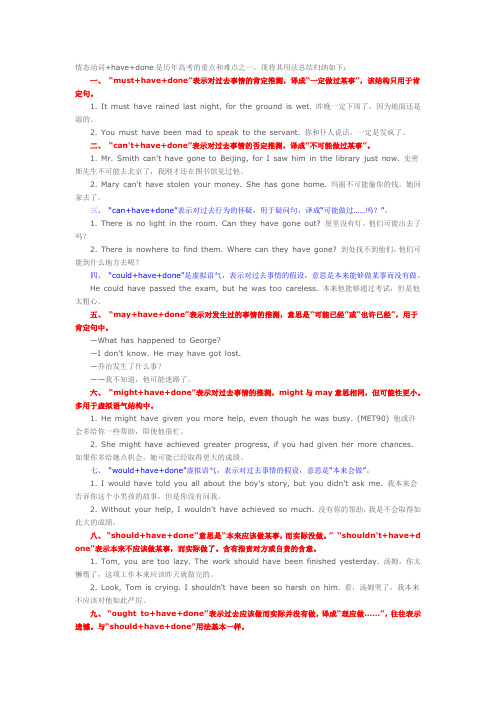
情态动词+have+done是历年高考的重点和难点之一,现将其用法总结归纳如下:一、“must+have+done”表示对过去事情的肯定推测,译成“一定做过某事”,该结构只用于肯定句。
1. It must have rained last night, for the ground is wet. 昨晚一定下雨了,因为地面还是湿的。
2. You must have been mad to speak to the servant. 你和仆人说话,一定是发疯了。
二、“can't+have+done”表示对过去事情的否定推测,译成“不可能做过某事”。
1. Mr. Smith can't have gone to Beijing, for I saw him in the library just now. 史密斯先生不可能去北京了,我刚才还在图书馆见过他。
2. Mary can't have stolen your money. She has gone home. 玛丽不可能偷你的钱,她回家去了。
三、“can+have+done”表示对过去行为的怀疑,用于疑问句,译成“可能做过……吗?”。
1. There is no light in the room. Can they have gone out? 屋里没有灯,他们可能出去了吗?2. There is nowhere to find them. Where can they have gone? 到处找不到他们,他们可能到什么地方去呢?四、“could+have+done”是虚拟语气,表示对过去事情的假设,意思是本来能够做某事而没有做。
He could have passed the exam, but he was too careless. 本来他能够通过考试,但是他太粗心。
五、“may+have+done”表示对发生过的事情的推测,意思是“可能已经”或“也许已经”,用于肯定句中。
B4M6情态动词+have_done的用法

八、 “need+have+done”
• 表示本来需要做某事而没有做。 “needn„t+have+done”则表示“本来不需要做 某事而做了”。 • didn‟t need to do 过去不必做某事,事实上也没 有做 • I needn„t have bought so much wine—only five people came. • I didn‟t need to do my homework yesterday, so I was very relaxed. • He need have hurried to the station. In that case, be wouldn't have missed the train.
2. You must have been mad to speak to the servant. 你和仆人说话,一定是发疯了。
二、 “can+have+done” “could+have+done”
• 常用于疑问句和否定句中,表示对过去的推测, 用于否定句中译成“不可能做过某事”。
• 1. Mr. Smith can„t have gone to Beijing, for I saw him in the library just now. 史密斯先生不 可能去北京了,我刚才还在图书馆见过他。
七、 “should+have+done” “ought to+have+done”
• 意思是“本来应该做某事,而实际没做。” “shouldn„t+have+done” “ought not to + have +done”表示本来不应该做某事,而 实际做了。含有指责对方或自责的含意。
情态动词+have done
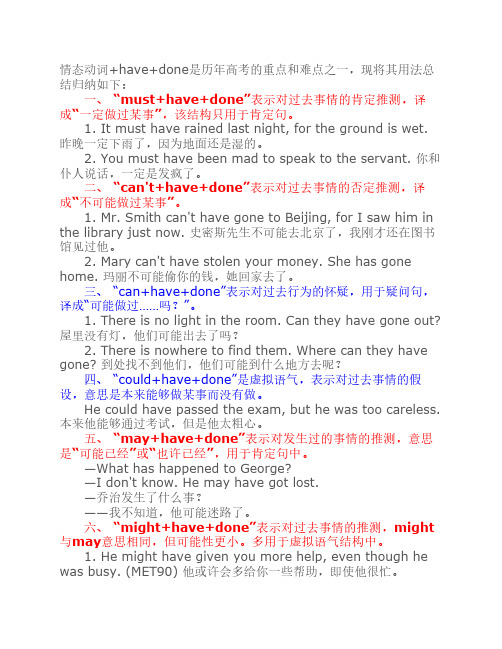
情态动词+have+done是历年高考的重点和难点之一,现将其用法总结归纳如下: 一、 “must+have+done”表示对过去事情的肯定推测,译成“一定做过某事”,该结构只用于肯定句。
1. It must have rained last night, for the ground is wet.昨晚一定下雨了,因为地面还是湿的。
2. You must have been mad to speak to the servant. 你和仆人说话,一定是发疯了。
二、 “can't+have+done”表示对过去事情的否定推测,译成“不可能做过某事”。
1. Mr. Smith can't have gone to Beijing, for I saw him in the library just now. 史密斯先生不可能去北京了,我刚才还在图书馆见过他。
2. Mary can't have stolen your money. She has gone home. 玛丽不可能偷你的钱,她回家去了。
三、 “can+have+done”表示对过去行为的怀疑,用于疑问句,译成“可能做过……吗?”。
1. There is no light in the room. Can they have gone out?屋里没有灯,他们可能出去了吗? 2. There is nowhere to find them. Where can they have gone? 到处找不到他们,他们可能到什么地方去呢? 四、 “could+have+done”是虚拟语气,表示对过去事情的假设,意思是本来能够做某事而没有做。
He could have passed the exam, but he was too careless.本来他能够通过考试,但是他太粗心。
五、 “may+have+done”表示对发生过的事情的推测,意思是“可能已经”或“也许已经”,用于肯定句中。
情态动词+havedone的用法小结
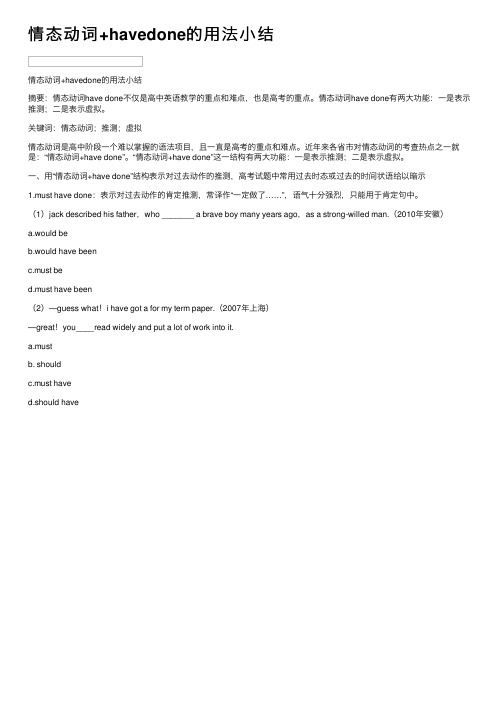
情态动词+havedone的⽤法⼩结
情态动词+havedone的⽤法⼩结
摘要:情态动词have done不仅是⾼中英语教学的重点和难点,也是⾼考的重点。
情态动词have done有两⼤功能:⼀是表⽰推测;⼆是表⽰虚拟。
关键词:情态动词;推测;虚拟
情态动词是⾼中阶段⼀个难以掌握的语法项⽬,且⼀直是⾼考的重点和难点。
近年来各省市对情态动词的考查热点之⼀就是:“情态动词+have done”。
“情态动词+have done”这⼀结构有两⼤功能:⼀是表⽰推测;⼆是表⽰虚拟。
⼀、⽤“情态动词+have done”结构表⽰对过去动作的推测,⾼考试题中常⽤过去时态或过去的时间状语给以暗⽰
1.must have done:表⽰对过去动作的肯定推测,常译作“⼀定做了……”,语⽓⼗分强烈,只能⽤于肯定句中。
(1)jack described his father,who _______ a brave boy many years ago,as a strong-willed man.(2010年安徽)
a.would be
b.would have been
c.must be
d.must have been
(2)—guess what!i have got a for my term paper.(2007年上海)
—great!you____read widely and put a lot of work into it.
a.must
b. should
c.must have
d.should have。
情态动词havedone的意思及用法

情态动词havedone的意思及用法
情态动词'have done'是由情态动词'have'和过去分词'done'构成的,表示完成的动作或状态。
这种情态动词常用于描述已经完成或需要完成的动作,并且在口语和书面语中都被广泛使用。
在英语中,情态动词'have done'可以用于多种语境,例如:
1. 表示完成的动作
例如:I have done my homework.(我完成了我的家庭作业。
)
2. 表示对过去发生的事情的确认或否认
例如:Have you done your presentation yet?(你的演讲做好了吗?)
3. 表示对未来事件的推断
例如:By next year, we will have done a lot to protect the environment.(到明年,我们会采取很多行动来保护环境。
)
4. 表示建议或命令
例如:You should have done a better job on that project.(你应该把那个项目做得更好。
)
总的来说,情态动词'have done'可以用于许多不同的语境,使其成为英语中非常有用的一种语言工具。
当你使用这个动词时,确保你的语境清晰明确,以使你的意思更加清楚。
情态动词+have done用法一览表

A.should face B. might faceC.could have facedD.must hae faced
情态动词的其他用法
1.Cannot but+do sth.表示“不得不/只好做某事”
Have no choice but to do
“情态动词+have done”用法一览表
情态动词+have done
用法
例句
Must have done
表示对过去事实有把握的推测,具有较大的可能性。只用于肯定句中,想必/准是/一定做了
否定式can’t/couldn’t +have done
Itmust have rainedlast night, for the road is quite muddy.
would+have done
表示与过去事实相反的假设或结果。
①I would have been happy to see him, but I didn't have time.我会很高兴和他见面的,但我没时间见他。
②If your father had still been alive, he would have felt very proud of you.你父亲如果还健在的话,他会为你骄傲的。
needn’t have done
用于对过去的责备,表示”本不必做而做了”
You needn’t have taken a taxi here, for it was very near to my house.你本来不必打车来这里的,因为离我家很近。
情态动词+have-done的用法

2. — I’m sorry. I ______ at you the other day. — Forget it. I was a bit out of control myself. (2008 江苏) A. shouldn’t shout B. shouldn’t have shouted C. mustn’t shout D. mustn’t have shouted
• 2. Without your help, I wouldn't have achieved so much.
没有你的帮助,我是不会取得如此大的成绩。
十、“need+have+done”
• 表示本来需要做某事而没有做。 “needn„t+have+done”则表示“本来不需 要做某事而做了”。 • I needn„t have bought so much wine—only five people came.
5. He did not regret saying what he did but felt that he _____ it differently. (2009 江苏) A. could express B. would express C. could have expressed D. must have expressed
•屋里没有灯,他们可能出去了吗?
• 2. There is nowhere to find them. Where can they have gone?
•到处找不到他们,他们可能到什么地方去呢?
四、“could+have+done”
• 是虚拟语气,表示对过去事情的假设,意思是 本来能够做某事而没有做, “本来可以” 。 • He could have passed the exam, but he was too careless.
- 1、下载文档前请自行甄别文档内容的完整性,平台不提供额外的编辑、内容补充、找答案等附加服务。
- 2、"仅部分预览"的文档,不可在线预览部分如存在完整性等问题,可反馈申请退款(可完整预览的文档不适用该条件!)。
- 3、如文档侵犯您的权益,请联系客服反馈,我们会尽快为您处理(人工客服工作时间:9:00-18:30)。
高考题
• 【经典考例1】 The weather turned out to be fine yesterday. I ________ the trouble to carry my umbrella with me. (2006江西) • A. should have taken B. could have taken • C. needn't have taken D. mustn't have taken • 【经典考例2】 We ________ have proved great adventurers, but we have done the greatest march ever made in the past ten years. (2006天津) • A. needn't B. may not • C. shouldn't D. mustn't • 【经典考例3】 As you worked late yesterday, you ________ have come this morning. (2006陕西) • A. mayn't B. can't • C. mustn't D. needn't
2. You must have been mad to speak to the servant. 你和仆人说话,一定是发疯了。
二、 “can't+have+done”
• 表示对过去事情的否定推测,译成“不可能做过 某事”。
• 1. Mr. Smith can‘t have gone to Beijing, for I saw him in the library just now. 史密斯先生不 可能去北京了,我刚才还在图书馆见过他。
七、 “would+have+done”
• 虚拟语气,表示对过去事情的假设,意思 是“本来会做”。 • 1. I would have told you all about the boy's story, but you didn't ask me. 我本来会告诉 你这个小男孩的故事,但是你没有问我。 • 2. Without your help, I wouldn't have achieved so much. 没有你的帮助,我是不 会取得如此大的成绩。
• 表示对发生过的事情的推测,意思是“可 能已经”或“也许已经”,用于肯定句中。 • • • • —What has happened to George? —I don't know. He may have got lost. —乔治发生了什么事? ——我不知道,他可能迷路了。
六、 “might+have+done”
四、 “could+have+done”
• 是虚拟语气,表示对过去事情的假设,意 思是本来能够做某事而没有做。 • • He could have passed the exam, but he was too careless. 本来他能够通过考试, 但是他太粗心。
五、 “may+have+done”
• 表示对过去事情的推测,might与may意思相同, 但可能性更小。多用于虚拟语气结构中。 • • 1. He might have given you more help, even though he was busy. (MET90) 他或许会多给你一 些帮助,即使他很忙。 • 2. She might have achieved greater progress, if you had given her more chances. 如果你多给她 点机会,她可能已经one”
• 表示过去应该做而实际并没有做,译成 “理应做……”,往往表示遗憾。与 “should+have+done”用法基本一样。
I ought to have gone home last Sunday. 我理应上星期日回家。 • You ought not to have given him more help. 你不应该帮助他那么多。
“情态动词+have done”的用法
毓思泽。 2010、1、18
一、 “must+have+done”
• 表示对过去事情的肯定推测,译成“一定 做过某事”,该结构只用于肯定句。 • 1. It must have rained last night, for the ground is wet. 昨晚一定下雨了,因为地面 还是湿的。
• 2. Mary can't have stolen your money. She has gone home. 玛丽不可能偷你的钱,她回家 去了。
三、 “can+have+done”
• 表示对过去行为的怀疑,用于疑问句,译成“可 能做过……吗?”。 • 1. There is no light in the room. Can they have gone out? 屋里没有灯,他们可能出去了吗? • 2. There is nowhere to find them. Where can they have gone? 到处找不到他们,他们可能到 什么地方去呢?
八、 “should+have+done”
• 意思是“本来应该做某事,而实际没做。” “shouldn‘t+have+done”表示本来不应该做某 事,而实际做了。含有指责对方或自责的含意。 • • 1. Tom, you are too lazy. The work should have been finished yesterday. 汤姆,你太懒惰了,这 项工作本来应该昨天就做完的。 • 2. Look, Tom is crying. I shouldn't have been so harsh on him. 看,汤姆哭了,我本来不应该对他 如此严厉。
十、 “need+have+done”
• 表示本来需要做某事而没有做。 “needn‘t+have+done”则表示“本来不需要做 某事而做了”。 • I needn„t have bought so much wine—only five people came. 我本来没有必要买这么多酒,只来 了五个人。 • He need have hurried to the station. In that case, be wouldn't have missed the train. 他本来需要快 点去车站,那样的话,他就不会误了火车。
